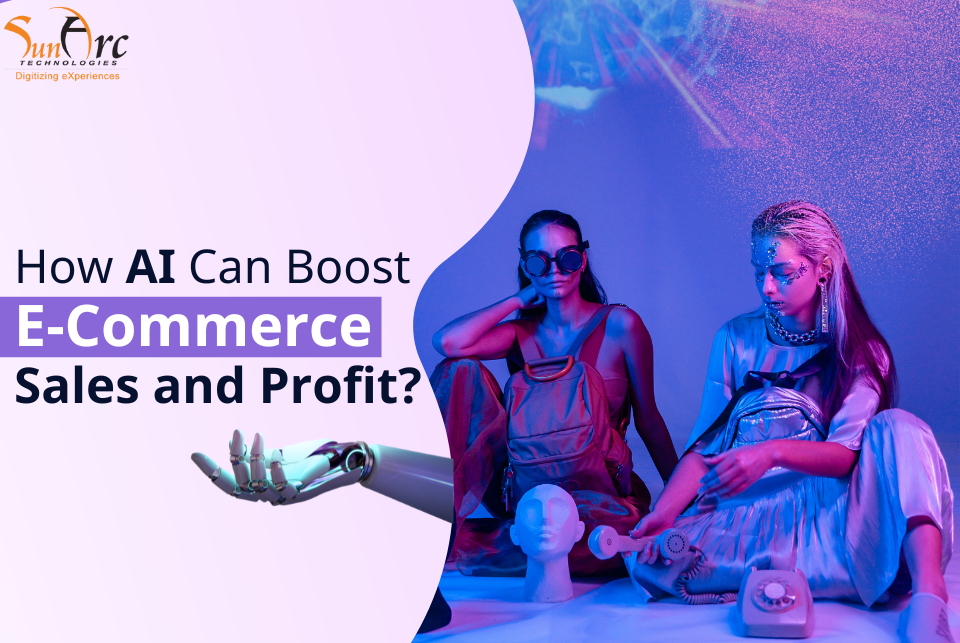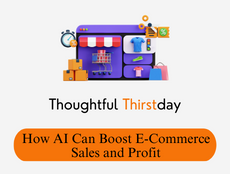Before diving into the question “How AI Can Boost E-Commerce Sales and Profit”, let’s have a look at the data related to it.
- According to Statista, 54% of e-commerce companies in France consider AI a crucial tool for analyzing their e-commerce data.
- As reported by Servion Global Solutions, AI is expected to power 95% of customer interactions by 2025.
- Approximately 37% of first-time customers who followed the link to an AI-driven eCommerce recommendation made a purchase. (Sources)
- 1 out of 5 consumers are open to buying products from a chatbot. (Sources)
This data shows that e-commerce businesses that adopt AI will have many opportunities for growth and success in the future.
Artificial intelligence is a valuable tool for eCommerce businesses. It can assist in identifying potential customers, engaging with them through chatbots, streamlining sales processes, optimizing online searches for customers, and performing other tasks with increased efficiency.
Read more: Metaverse In E-Commerce; Why Retailers Need To Pay Attention?
If you own an online store, this blog will be very helpful. It will teach you how to use AI to increase your E-Commerce store’s sales and profit.
Let’s raise your E-Commerce sales graph…!!

How AI Can Boost E-Commerce Sales and Profit?
AI can boost E-Commerce sales and profit by:
1. Providing Algorithmic Personalized Suggestions
The application of artificial intelligence (AI) in E-Commerce presents a notable advantage in personalizing the customer experience. Artificial intelligence algorithms can analyze various data points, such as a customer’s browsing history and purchase history, to provide personalized product recommendations.
AI enhances the E-Commerce ability to improve customers’ experiences by delivering personalized suggestions, which may ultimately lead to improved customer loyalty, increased sales and better revenue.
For example, Amazon employs AI algorithms to provide product recommendations to consumers based on customers’ previous browsing and purchasing behavior. The firm estimates personalized recommendations contribute up to 35 percent of the company’s total income.
Read more: 15 Most Important E-Commerce KPIs To Track And Grow Sales Faster
2. Utilizing Chatbots, Aka Conversational Agents
The integration of chatbots like ChatGPT is revolutionizing the e-commerce industry through AI technology. Chatbots are advanced computer programs that can mimic human-like conversations with customers. They are designed to provide customers with relevant information, address their queries, and aid them in making informed purchase decisions.
Chatbots offer round-the-clock assistance to customers, ensuring they receive support beyond standard business hours. Moreover, chatbots can efficiently manage a large influx of customer inquiries, thereby minimizing the requirement for human customer service representatives.
For example, H&M leverages a chatbot on Facebook Messenger to assist shoppers in discovering items and completing transactions. These chatbots utilize advanced natural language processing (NLP) technology to comprehend and promptly address customer inquiries with accuracy effectively.
Read more: SEO for E-Commerce Product Pages: The Do’s And Don’ts
3. Assisting In Supply Chain or Inventory Management
Effective inventory management is crucial for any successful e-commerce business. Properly managing inventory can help business owners to avoid stockouts, reduce carrying costs, and improve overall profitability. By implementing a robust inventory management AI system, you can ensure that you always have the right products in stock, at the right time, and in the right quantities.
A smooth supply chain is essential for businesses to operate efficiently and maximize profits.
For example, Walmart utilizes AI to enhance its inventory management, resulting in a 15% decrease in stockouts. The company utilizes artificial intelligence (AI) to analyze sales data and predict demand. Based on these predictions, the company adjusts its inventory levels accordingly.
Read more: Important Features That Online Shoppers Expect From Ecommerce Websites
4. Leveraging The Science of Predictive Analysis
In e-commerce, predictive analytics involves leveraging data, statistical algorithms, and machine learning techniques to determine the probability of future outcomes.
Predictive analytics is a powerful tool in the world of e-commerce. It enables businesses to pinpoint the customers most likely to make a purchase, identify the products likely to sell, and determine which marketing campaigns are most likely to succeed.
For example, Netflix uses predictive analysis to determine what TV episodes and movies its subscribers would enjoy the most. Customers’ watching habits, interests, and other data are analyzed by the company’s algorithms so that they may provide tailored suggestions.
5. Enabling the Power of Visual Search to Attract Customers
Visual search technology allows users to search for products using images instead of text-based queries. This technology uses artificial intelligence and machine learning algorithms to analyze the visual features of an image and match them with similar products in a retailer’s inventory.
Read more: Best E-Commerce Marketing Strategies to Increase Online Sales
Visual search allows shoppers to easily find products that match their preferences and style without typing in specific keywords. This technology is revolutionizing how people shop online, making it faster and more convenient to find the desired products.
For example, Pinterest leverages AI-driven visual search functionality to assist users in discovering products by uploading images. Its cutting-edge visual search algorithm carefully analyzes the image and delivers highly relevant product recommendations to the customers.
Read more: Best Platforms To Launch Your E-Commerce Store In 2023
Thoughts
The widespread adoption of AI in e-commerce has fundamentally altered the competitive landscape. Personalization, chatbots, inventory management, visual search, and predictive analytics are just some of the ways AI is helping e-commerce companies better understand their customers and their buying habits, which in turn is increasing sales and profits.
E-Commerce brands need to turn to artificial intelligence to stay ahead of the competition and give their customers the best possible experience.
If you are considering stepping into the E-Commerce industry, contact our E-Commerce experts. Our team of E-Commerce experts is dedicated to helping you take your business to the next level.

